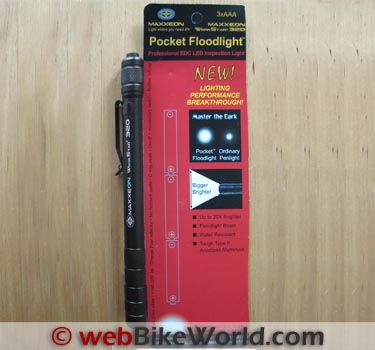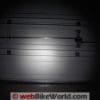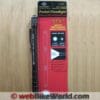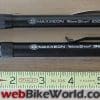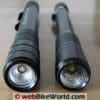The Maxxeon WorkStar 320 is a slightly enlarged version of the excellent Maxxeon WorkStar 220 Pocket Floodlight (review).
The WorkStar 320 takes three easier-to-find AAA batteries, instead of the three AAAA batteries in the WorkStar 220.
Two years ago, Rick K. described the Maxxeon Pocket Floodlight 220 (review) as “a cool little LED flashlight that is very well made and puts out an amazing amount of light for its size.”
And a host of readers agreed with him, too.
My WorkStar 220 Pocket Floodlight easily became my favorite flashlight.
It’s rugged, beautifully machined and O-ring sealed, remarkably compact, and does indeed put out a lot of light.
However, what most sets it apart from other flashlights is the quality of that light, which Maxxeon touts as having “no rings, no shadows, no hot spots.”
That aspect — the clarity of its output — is truly impressive and really has to be seen to be appreciated.
The purity and quantity of light make the 220 an outstanding flashlight.
The only fly in the ointment is that the 220 uses three AAAA batteries.
On the road, you’re unlikely to find these quadruple-A batteries at the nearest Kwik-E-Mart; further, while most Radio Shack stores carry AAAAs, they’re expensive.
Last, if, like me, you’re fond of the Energizer lithium batteries, the smallest size those come in is AAA.
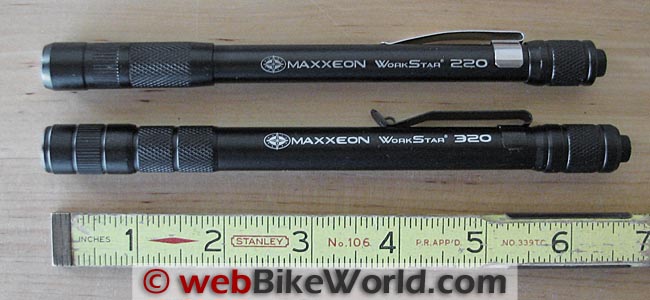
Problem Solved?
Enter the Maxxeon WorkStar 320 Pocket Floodlight. With only a very modest increase in size and weight, the WorkStar 320 uses three AAA batteries!
Maxxeon lists both the WorkStar 220 and the WorkStar 320 as using the Cree XP-E, Cool White, 3W bulb, with both flashlights having a run time (with alkaline batteries) of two to four hours, depending on use.
The brightness of both flashlights is also said to be the same…sort of: having “greater than 140 OTF (out-the-front)” lumens.
The increase in overall length for the WorkStar 320 is about 13 mm (1/2″).
The WorkStar 220 is 162 mm (6-3/8″) long, while the WorkStar 320 is 175 mm (6-11/16″) in length.
The main barrel diameter of this pair of Pocket Floodlights is 11.0 mm for the 220 and a slightly thicker 12.5 mm for the 320.
And the increase in weight? On my digital scale, with their respective (included) batteries installed, the WorkStar 220 comes in at 47 grams (1.7 oz.), while the 320 weighs 60 grams (2.1 oz.).
Both Pocket Floodlights are made from T6 aluminum with black Type II anodizing. Also, the business end includes an anti-reflective coated glass cover over the reflector.
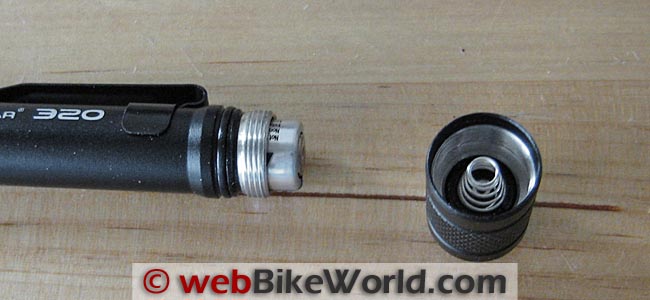
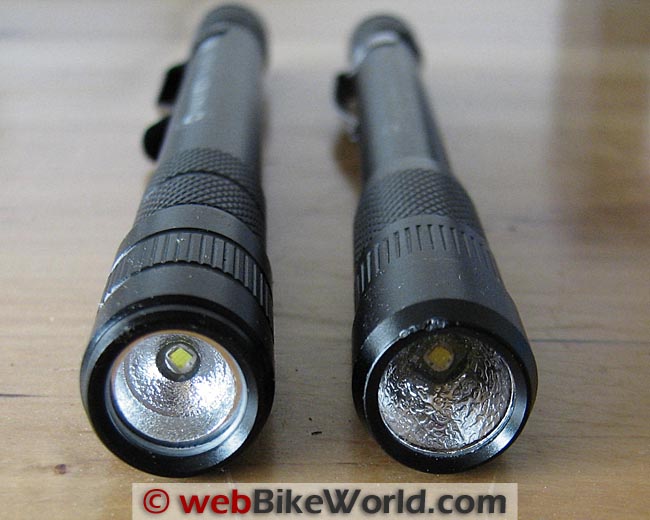
BUY YOUR Maxxeon Pocket Floodlight and Maxxeon Flashlights Here!
Output of the Maxxeon WorkStar 320 vs. 220
In addition to enlarging the barrel to allow the use of AAA batteries, the reflector on the WorkStar 320 has also been modified.
While Maxxeon describes both the 320 and 220 as having a “diameter ratio is about 1:1, meaning at 1 ft. from an object, the beam is about 1 ft. wide,”
I found that the WorkStar 320 Pocket Floodlight has a ratio of about 1:1.6, while the older WorkStar 220 ratio is approximately 1:1.4.
To put it another way, at a distance of 5 feet, the WorkStar 320 has a circle of illumination about 8 feet in diameter, while the circle of illumination from the “original” WorkStar 220 Pocket Floodlight is about 7 feet in diameter at the same distance.
If you define a “hotspot” as one or more bands of darkness or other light artifacts, the older 220 doesn’t have any.
But the 320 has an even more uniform output.
The reflector in the 320 is a kind of two-tiered affair, while that in the 220 is deeper and has a single curve.
This gives the WorkStar 220 a more center-weighted brightness, which tapers off abruptly as you near its outer limits of illumination.
While the purity of the light output from both of these Pocket Floodlights is impressive, the WorkStar 220 is more of a spotlight to the 320’s floodlight. This can be a good thing or not, depending on your usage.
And in case you were wondering — no, you can’t interchange the business ends of these flashlights, due to different thread diameters.
Want more “Professional” output? Check out the Maxxeon WorkStar 20000 Technician’s Floodlight review.
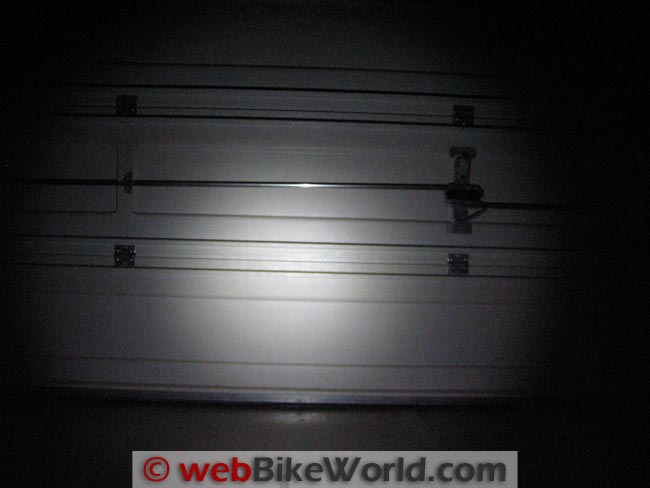
Where to Get It
The Maxxeon WorkStar 320 Pocket Floodlight can be difficult to find at retail. It is sold directly through Maxxeon itself and but the shipping cost for an individual unit is high.
However, shipping apparently remains constant regardless of the number of flashlights ordered, so my cost-effective suggestion it to chip on with some friends and buy a few at the same time.
Conclusion
The Maxxeon WorkStar 320 Pocket Floodlight produces an abundant amount of pure light in a small, high-quality, package and it is powered by readily-available AAA batteries.
Its output is even more uniform than that of the Maxxeon WorkStar 220 Pocket Floodlight.
With its reworked reflector, the 320 is the better flashlight for walking the dog at night, for instance, to see where the two of you are going.
But what about working on your bike, when you’ve just dropped a small bolt into what appears to be a newly discovered black hole in your bike’s frame or bodywork?
Or finding the dropped washer that has to be on the garage floor, right around here… somewhere? Or when you’re on the side of the road at night, trying to locate a nail in the back tire?
For those cases, when you need all the fire-power, er, candle-power you can muster, the older WorkStar 220 is still the flashlight of choice — the paucity of stores stocking quadruple-A batteries notwithstanding
Mine’s staying in my tool-wrap. I haven’t decided whether the newer WorkStar 320 will join the WorkStar 220 on the bike for backup purposes or whether to put it in my car’s glovebox. Or maybe get another 320, and do both…
BUY YOUR Maxxeon Pocket Floodlight and Maxxeon Flashlights Here!
| wBW Review: Maxxeon WorkStar 320 Pocket Floodlight | |
|---|---|
| Manufacturer: Maxxeon | List Price (2013): $36.95 + $9.95 S/H |
| Colors: Black | Made In: China |
| Warranty: One Year | Review Date: August 2013 |
Owner Comments and Feedback
See details on submitting comments.
From “P.W.” (August 2013): “Have built and owned a lot of LED lights and carry 4 on my RT.
FWIW, I don’t carry lights using oddball batteries like the AAAA. And even AAAs can be hard to locate in some places even if you’re willing to settle for alkalines.
The AA is the most commonly available battery in all types and is the one best carried.
An alternate if you buy them in bulk at reasonable price (about $1.50 each then) is the disposable 123 lithium.
It has higher energy density than the AA and supports long usage better. I just carry a couple spares in a baggie in my toolkit for those lights. In a real pinch they can be bought in drugstores as camera batteries but are way overpriced that way.”
From “W.M.” (August 2013): “Nice torch, but 3xAAA is silly. 2xAAA is plenty. The Pelican 1920 is a good option at $20.
I also found basically the same light as the 1920 at Home Depot (USA), but it doesn’t have any branding and slightly different shaping to the end caps –it cost me like $10. Another option to consider.
Editor’s Reply: Actually, there are many flashlights that use AAA batteries, but not many (or none) like the “Pocket Floodlight”, which has a nearly perfect circle of light with no “hot spots” or other artifacts. This is what has made the Pocket Floodlight series so popular.
Also, the size and shape of the 320 Pocket Floodlight (Bic pen size) pretty much dictates the three AAA batteries.
The original Maxxeon WorkStar 220 Pocket Floodlight was a big hit but owners complained about the AAAA batteries, so Maxxeon came out with the 320.
But the 220 is still a good choice for a pocket-sized light, it’s about the size of a Bic pen and the 320 isn’t much larger.


